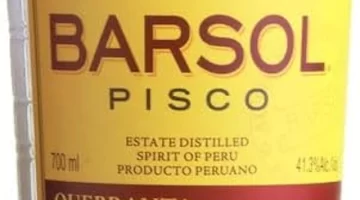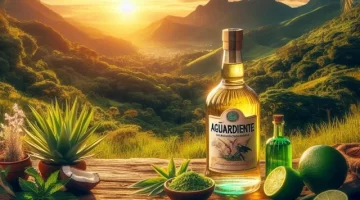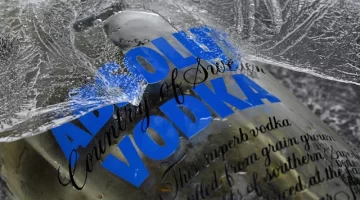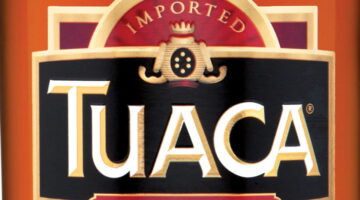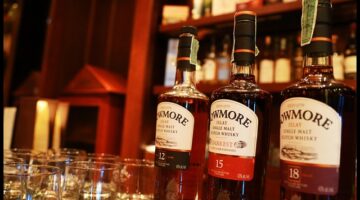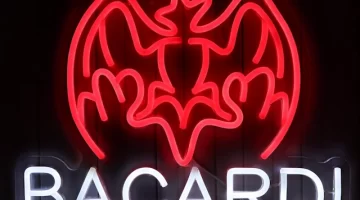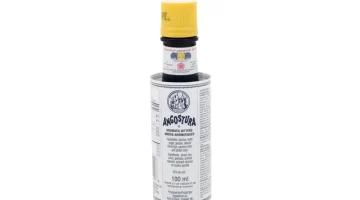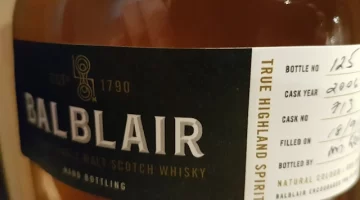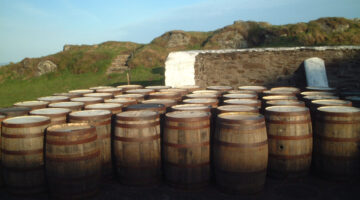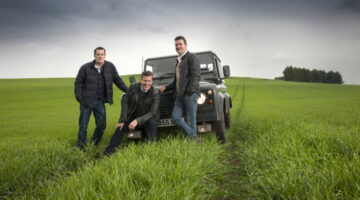Whisky Bides its Time on Speyside
Whisky Bides its Time on Speyside: Travel Distilled visits the Speyburn Distillery and the Knockdhu Distillery, where they make anCnoc.
It’s a sunny morning on Speyside. Sheep and cattle are grazing in fields backed by a spine of low hills, though the lushness of the grass tells you how much rain falls here in Scotland’s prime whisky-making region.
Speyside has the greatest concentration of distilleries in the world, and I’m here to see two of them. The afternoon will take me to Speyburn, but first it’s Knockdhu, makers of anCnoc.
Visiting Knockdhu
We drive past a farm, almost through the farmyard, and then see the distinctive pagoda that tells us we’ve reached Knockdhu. We’re greeted by Alistair Reid, the Assistant Manager, who has been at Knockdhu since it re-opened in 1989. Founded in 1893, the distillery was closed in 1983.
“The entire distillery was mothballed,” says Reid, “until Inver House came along and bought it in 1989. When they re-opened it, someone flicked a switch and everything came straight back on again.”
Today the distillery runs seven days a week, with a surprisingly small staff for such a large operation.
“We have six multi-talented and multi-tasking guys here who make whisky, do a spot of welding, keep the place tidy, and several other jobs besides. The water comes from four springs on the hill that gives us our name, Knockdhu, or Black Hill.”
In 1994 the name of the whisky – but not the distillery – was changed from Knockdhu to anCnoc (pronounced an-nock and Gaelic for ‘The Hill’) to avoid confusion with the Knockando brand. The name is traditional and so are the production methods, as Reid explains that everything is done by hand and there isn’t a single computer involved in the whisky-making process.
“Actually,” he says, “we do have one and I’ll show you that later.”
Later comes as we visit the Mash Tun room, and Reid shows us an ancient and rather dusty huge calculator that must have been around since the distillery re-opened. He then takes us into one of the warehouses, which is surprisingly new for such an old distillery.

“Aye,” says Reid. “Well, in 2009/10 we had a very good winter for making whisky but we also had a lot of snow. We had snow, snow, and more snow, so much so that on January 10th, 2010, two warehouses collapsed through the weight of the snow on the roofs. And when the roofs collapsed they caused the walls to bulge.”
Reid was on night duty that night, and describes getting a phone call from Distillery Manager Gordon Bruce, who had been out walking his dog and saw the roofs collapse.

“He told me he thought I ought to get out and take a look at the warehouses, and get the fire brigade out. Even though it was snowing, there was a lot of whisky sloshing around and one electrical spark could cause a major blaze. There were 2,450 casks stored in the two warehouses and by the time we got the casks out there were 18 empty casks. It still brings a tear to my eye, although I suppose it could have been a lot worse.”
As we do a tasting and sip our way through some of anCnoc’s range – a 16-Year-Old, an 18-Year-Old and a really intensely-flavoured 24-Year-Old – it’s easy to see why Reid was devastated to lose what initially seems like a small number of barrels. Every sip of these superb whiskies has taken talent and time to produce, and 18 casks is a lot of sips.
Visiting Speyburn
From Knockdhu it’s a 30-minute drive to Speyburn, past tree-covered ranges of hills, and more sheep chomping on the rich grass. At a place called Boat o’ Brig we wait our turn to cross a single-track steel bridge that takes us over the River Spey and on to Speyburn.
Speyburn was founded in 1897, and like Knockdhu has a collection of magnificent old Victorian buildings, one of which hides a surprising secret. Inside is a row of six impressive round white and turquoise structures, which are the original malting ovens.

“They’re in splendid condition,” says Assistant Distillery Manager Andy Fiske, something we can see for ourselves. “We malted our own barley until 1968, so these are no longer used, and Historic Scotland has said that they cannot be moved, though we’ve no intention of doing that anyway. We’re content for them to sit here and remind us of our history and heritage.”
Speyburn is near to lots of suppliers of malt so no longer needs to produce its own. The distillery is tucked into a peaceful little valley and surrounded by trees, and has little room for extra storage or expansion, so buying rather than storing makes sense.

Going Underground
Unable to expand outwards, Speyburn has done something unusual and expanded downwards. Some of their cellars are on two levels, one level dug out below ground. I confess that at this point I skipped the rest of the distillery tour, my fourth one in two days. There’s only so much you need to know about the production process.
Instead, I returned to their tasting room and poured myself another wee dram of their superb Speyburn Arranta, made exclusively for the US market in ex-bourbon casks. I took it outside and sat on a wall in the sunshine. I enjoyed its flavours of apple and coconut, and some caramel tastes from the barrels, some vanilla and spiciness too.
Putting my notebook away, I sipped at the whisky while gazing around at the whitewashed buildings of the distillery and at a beautiful old stone house on a slight rise, presumably the distillery manager’s house. Surrounded by trees, it also gazed out across the buildings, where even now tens of thousands of barrels were slowly maturing, biding their time.
More Information
To find out about visiting Knockdhu, see the anCnoc website.
Public tours are not currently available at Speyburn.
Don’t miss my review of the Speyburn 10-Year-Old.
All Photos (c) Mike Gerrard.
You can buy a range of Knockdhu and Speyburn whiskies at Master of Malt and at Caskers.
More Information
To find out about visiting Knockdhu, see the anCnoc website.
Public tours are not currently available at Speyburn.
Don’t miss my review of the Speyburn 10-Year-Old.
All Photos (c) Mike Gerrard.
You can buy a range of Knockdhu and Speyburn whiskies at Master of Malt and at Caskers.

















